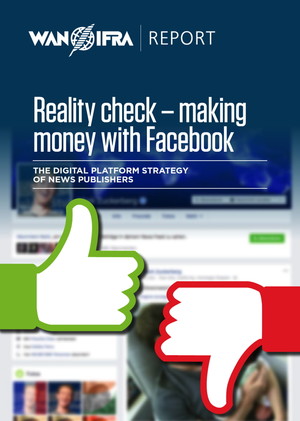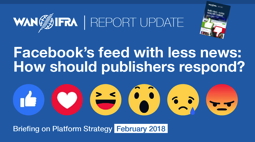Reality check – making money with Facebook
Reality check – making money with Facebook

Price
- For non-members: 250 EUR
- For WAN-IFRA members: Free
Download
Employees of WAN-IFRA member organizations can download the report free of charge here, as a membership benefit:
(Note: You do not need your log-in – just your e-mail address.)
Attention non-members: Click here to purchase the report.
Not yet a member? Learn more about WAN-IFRA membership.
Summary
The digital platform strategy of news publishers
How many publishers have a real platform strategy that focuses on the revenue opportunity? Too few. The result is collective uncertainty, veering from enthusiastic early adoption of Instant Articles to demanding revised anti-trust laws to allow news media to compete collectively with Facebook.
This report is all about rethinking your relationship with Facebook: is it a distribution platform or a marketing platform? Or perhaps even an e-commerce partner?
WAN-IFRA called on industry expert Grzegorz Piechota (see below), who has written about Facebook and platforms on numerous occasions, to author the report.
"Greg has spoken to publishers. He is outspoken and entertaining in his approach. He has interviewed contrarians like Scott Galloway, but also backs up this report with plenty of useful data points and strategy tools that can be applied in your own business. In short, highly recommended reading."
– Nick Tjaardstra, WAN-IFRA Global Advisory Director.
A number of publishers shared their thoughts and strategies on Facebook, and Piechota presented some key case studies about:
- Gazeta Wyborcza: Polish publisher is using Facebook for business growth
- Paralos Curiosos: Spanish-language startup piggybacks Facebook to success
- BuzzFeed: An evolving business model and gamble on FB TV
- New York Times: Using Facebook to drive subscriptions
- BILD: A deep evaluation of Instant Articles
Some findings & recommendations
- In general, news publishers cannot rely solely on monetisation programmes offered by Facebook and other digital platforms. WAN-IFRA members reported that Facebook contributed on average 7% of their digital business revenue.
- Facebook’s cost of revenue that includes any payments to news publishers represents a significantly lower share of revenue than do content-provision costs of other major platforms like Google, Spotify or Twitter, our research suggests.
- Although Facebook and other platforms promise to improve their monetisation programmes and in the future can share much more revenue with the industry than they do today, this source of funding is not likely to become sufficient for all publishers in all markets, our calculations demonstrate.
- As this report shows, new revenue sources such as digital subscriptions, e-commerce and branded content may bring news publishers greater returns than monetisation programmes on the platforms in the short term, and in the long term they seem to offer greater opportunities than digital display advertising can offer.
Other takeaways
- Facebook is just one of the digital disruptors. News publishers need to find a strategic response to digital disruption from all kinds of platforms, not only Facebook. The solution needs to be long-term; one cannot change strategy whenever Facebook tweaks its algorithm.
- The solution needs to address the root issue, which is not Facebook, but the behaviour of news consumers. Platforms let news consumers decouple activities that used to come together: consuming news content and seeing the ads that funded the content. Many news consumers hate the ads, and find personalised news feeds very useful.
- Platforms such as Facebook have strongly incentivised product innovation, as it suited their needs. They have provided tools, promoted new formats with changes in algorithms, and trained newsrooms. Publishers could not resist, because they were chasing reach, hoping to monetise the audience with display ads.
- At the same time, the digital platforms innovated with their business models and created global marketplaces that attracted users, publishers and advertisers, and built a trove of data by tracking their behaviour. Today, Google and Facebook claim most of the value of the digital-advertising market.
- The concept of audience is outdated. Modern customers expect to be known as individuals with distinct needs and preferences, and assume service will be personalised. Data management and analytics become the core business of publishers. Data is the new competitive advantage.
What they are saying about the report
"I highly recommend every journalist and news executive to dive deep into this report if you are serious about building a solid platform strategy for all the digital disruptors of today and tomorrow. Brace for impact."
Xavier Van Leeuwe
Director Marketing and Data
NRC Media, Amsterdam
"A great, insightful report I must say."
Chairul Fahmy, Deputy Digital Editor,
Singapore Press Holdings
 New report on
New report on
news feed changes
In February 2018, Piechota wrote a follow-up WAN-IFRA Report, "Facebook’s feed with less news: How should publishers respond?" Published in a new "slide deck" format, it also is available for free to WAN-IFRA Members and for sale to non-members.
About the author
 Grzegorz Piechota (“Greg”) has written about Facebook on numerous occasions. He conducted research for this report while studying digital disruption at Harvard Business School (from September, he works at the Reuters Institute for the Study of Journalism, University of Oxford). He has analysed the patent submissions for each part of the Facebook algorithm. He knows the company and has the publisher insight from Poland’s largest news publisher, Gazeta Wyborcza.
Grzegorz Piechota (“Greg”) has written about Facebook on numerous occasions. He conducted research for this report while studying digital disruption at Harvard Business School (from September, he works at the Reuters Institute for the Study of Journalism, University of Oxford). He has analysed the patent submissions for each part of the Facebook algorithm. He knows the company and has the publisher insight from Poland’s largest news publisher, Gazeta Wyborcza.
- Date:
- 2017-09-08
- Language:
- English
- Type:
- WAN-IFRA Report
- Number:
- 1
- Author:
- Grzegorz Piechota
Contact information

Dean Roper
Director of Insights, Editor-in-Chief
WAN-IFRA
| Frankfurt am Main,
Germany
Phone: ++49-69-240063-261
E-Mail: dean.roper@wan-ifra.org

